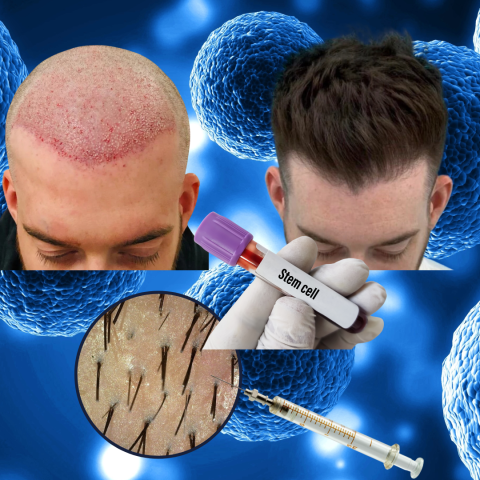A stem cell hair transplant, also known as a stem cell hair restoration or stem cell hair therapy, is a type of hair transplant procedure that uses stem cells to promote hair growth.
In traditional hair transplants, hair follicles are typically harvested from one area of the scalp (called the donor site) and transplanted to another area where hair loss has occurred (called the recipient site). However, stem cell hair transplants incorporate stem cells into the process to potentially enhance the effectiveness and success of the procedure.
Stem cells are undifferentiated cells with the potential to develop into various types of cells in the body. In the context of hair restoration, stem cells are believed to stimulate hair follicle regeneration and growth, leading to thicker, healthier hair.
There are different approaches to incorporating stem cells into hair transplant procedures. Some methods involve extracting stem cells from the patient's body, typically from fat tissue or bone marrow, and injecting these stem cells into the scalp along with the transplanted hair follicles. Other approaches may involve using stem cell-rich solutions or products to promote hair growth during and after the transplant procedure.
Stem Cells Unproven in Hair Restoration
While stem cell hair transplants show promise in promoting hair growth and improving the outcomes of hair restoration procedures, more research is needed to understand their effectiveness and long-term benefits fully. Additionally, the availability and use of stem cell-based treatments may vary depending on regulatory approvals and medical practices in different countries. It's essential for individuals considering this type of procedure to consult with a qualified healthcare provider or hair restoration specialist to discuss the potential risks, benefits, and suitability for their specific needs.
To date, no clinical studies have compared stem cell hair transplantation to regular hair transplantation. Most clinics offer stem cells as a marketing gimmick to entice people into the door. It's not proven. However, it is an area that should be studied further and may have some benefit in the future. At present, it's not a treatment you should consider.
What works?
Most treatments on the market do nothing except drain your bank account. That's why it's essential to research before spending your hard-earned money on an ineffective, useless product. Below is a list of what works.
Medications:
- Minoxidil (Rogaine): A topical solution or foam applied to the scalp, minoxidil is believed to stimulate hair follicles and promote hair growth. It's available over the counter and is often used for male and female pattern baldness.
- Finasteride (Propecia): This oral medication is FDA-approved for treating male pattern baldness. It works by blocking the conversion of testosterone into dihydrotestosterone (DHT), a hormone that contributes to hair loss in some individuals.
- Dutasteride: Similar to finasteride, dutasteride inhibits the production of DHT and may be prescribed off-label for hair loss treatment.
Surgical Procedures
Hair Transplant Surgery:
- Follicular Unit Transplantation (FUT): Also known as strip harvesting, FUT involves removing a strip of scalp from the donor area (typically the back of the head) and transplanting individual hair follicles to the balding or thinning areas.
- Follicular Unit Extraction (FUE): In FUE, individual hair follicles are extracted from the donor area using a punch tool and then transplanted to the recipient site. Compared to FUT, FUE typically leaves tiny scars that are less noticeable.
It's vital to research hair loss forums carefully, like the Hair Restoration Network. The Hair Restoration Network is one of the largest and oldest hair loss communities, with over 37,000 members since 2001. You can find out about the best hair loss treatments and the best hair transplant surgeons based on actual results and reviews from other hair loss sufferers.

